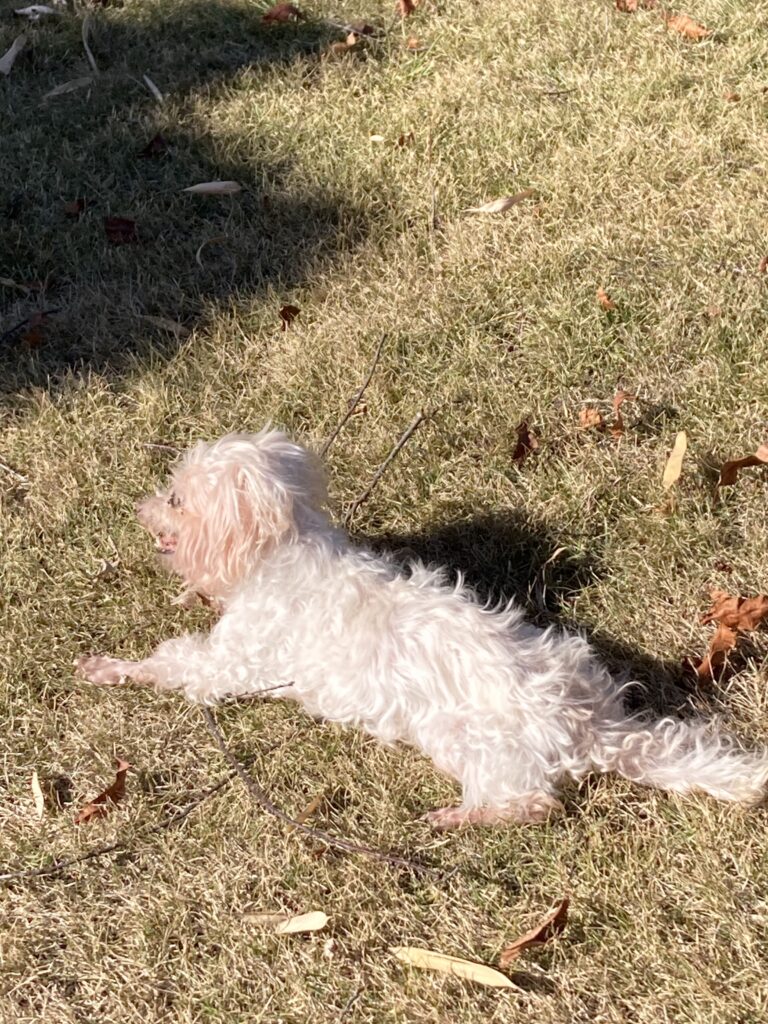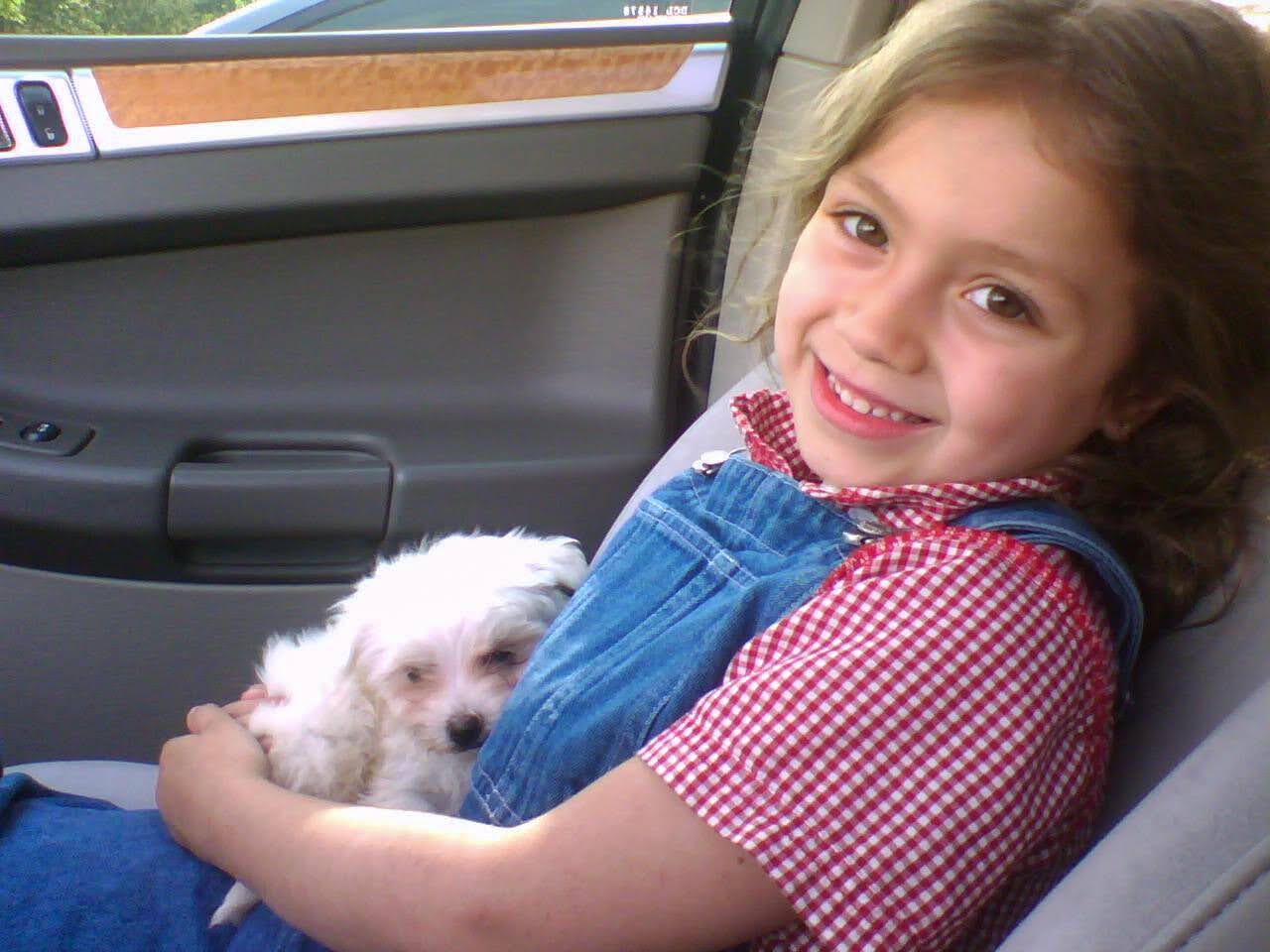It was Hillbilly Day at School
After my parents picked me up, we went straight to get her. I remember holding her proudly on my lap in my overalls on the drive home. With her in my arms and a big smile on my face, I named her Snowball. Since I was five, I have always had Snowball by my side. She has been our family dog for 17 years. She has always been here through every exciting moment, hard season, and mundane day. Anytime you were at my mom and dad’s house, you would hear the pitter-patter of her little paws on the ground, the jingling of her bell collar, or her soft snoring when she was taking a nap on your lap.
I can’t describe what it is like to lose a dog that grew up with you. If you have had the honor yet also the grief of losing a loved life-long animal, you, too, understand that the sorrow is so bittersweet. Memories sweep through your mind like waves on the shores. It comes with a hard crash but resolves back slowly and peacefully. Sweet baby girl Snowball is so precious to our family. Her memories will always bring back a smile to our faces. I find much value in the little life she lived.
So, what happens on a physiological level that draws us so close to our sweet pets?
Lisa Dion, LPC, RPT-S, writes in her article, Man’s Best Friend: The Neuroscience Behind the Animal/Person Connection, “While Oxytocin is important, it’s not the only reason we’re drawn to drool and tail wags. Pet interaction also boosts endorphins and serotonin. This helps us ward off depression. And, because mental well-being influences the physical body, these chemicals might help explain why people that surround themselves with animals often live longer and often report feeling healthy and living a higher quality life.”
The three primary neurotransmitters affecting the animal-person connection:
•When I first think of the hormone Oxytocin, I think of labor & delivery. In nursing school, I studied how Oxytocin (Pitocin) aids in labor contractions, decreases the risk of hemorrhaging, and initiates maternal bonding. Not only does it impact pregnant women and their babies, but it also impacts you and me daily. Oxytocin is an inhibitory neurotransmitter that influences our social bonding and affects our trust and empathy. Inhibitory neurotransmitters block or “inhibit” a chemical message from being received; for example, they can block pain signals from being accepted.
•Serotonin is an inhibitory neurotransmitter that regulates sleeping patterns, anxiety, mood, and pain. It also affects learning, memory, reward, and more.
•Endorphins are also inhibitory neurotransmitters released by the hypothalamus (the leading player in homeostasis) and the pituitary gland (the main endocrine gland). These hormones enhance your well-being, improve mood, alleviate pain, and decrease stress.
Our connection with our pets has both a physiological and a psycho-social effect.
Sarah Hogan DVM explains in her lovely Ted talk, “The unconditional love that makes a human and animal bond.“ Our animals are never judging or being critical of us- even though some give a side glance, haha, you know they still love you regardless. Another point she makes is, “Animals are so much better at forgiveness than humans.” In my experience, it didn’t matter what I did; my sweet Snowball was beside me, wagging her tail and giving me kisses.
Dogs forgive you if you are energetic, acting silly and annoying, or downcast and crying. They forgive you for whatever mood you are in and are there to comfort you. One of the final points Hogan makes is, “In your lifetime together, your pet was devoted to you. And they proved it with their actions when you needed it the most.” It makes sense that we would form a tight bond with someone who loves us no matter what, does not criticize, forgives quickly, and comforts us when we need them most. We develop a genuine friendship with our pawed pals for all these reasons listed above. So, hold tightly to the animals you love. If you have lost your animal, it is understandable to feel the way you do. Even if someone doesn’t understand, continue to remember them and what they meant to you and your family.
Here is to you, Snowball, and the joy you brought us. Until I get to hug you again one day, sweet girl.

Lord, thank you so much for all the relationships you have given us in our lives. Thank you for letting us feel so much love and joy from your creation. You didn’t have to give us these incredible gifts, but you did praise you, Father.
RESOURCES
Dion, L. (2022, March 4). Man’s best friend: The Neuroscience behind the animal/person connection. Synergetic Play Therapy Institute. https://synergeticplaytherapy.com/mans-best-friend-neuroscience-behind-animalperson-connection/
Hogan, S. (2022, November 10). Pet loss grief; the pain explained: Sarah Hoggan DVM: TEDxTemecula. YouTube. https://youtu.be/TkJGhQANjZo?si=QONVsSEsBvOoeJU9

